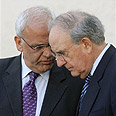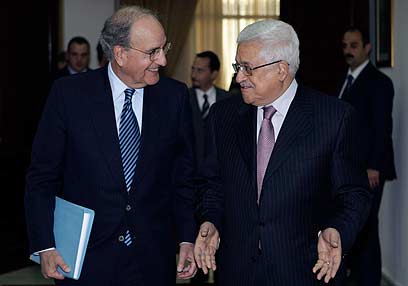
US envoy fails to lure Abbas back to Mideast talks
Day after Obama admits he may have overestimated his ability to revive negotiations, Palestinian president tells Mitchell during three-hour meeting in Ramallah that complete halt to settlement construction must precede resumption of peace talks
President Barack Obama's Mideast envoy failed Friday to lure Palestinian President Mahmoud Abbas back to peace talks with Israel, as Abbas stuck to his insistence that an Israeli settlement freeze come first.
The three-hour meeting in Ramallah between Abbas and Washington's envoy, George Mitchell, came a day after Time magazine published an interview with Obama in which the president acknowledged he may have overestimated his ability to revive negotiations.
Mitchell, who also held talks with Israeli Prime Minister Benjamin Netanyahu, is to leave the region over the weekend. The envoy has said Obama remains committed to trying to broker a Mideast deal, but it's unclear what he could try next.
Following the meeting, chief Palestinian negotiator Saeb Erekat told reporters in Ramallah that Abbas asked Mitchell to "prevent Israel from taking steps to create facts on the ground in order to turn the negotiations into a series of dictations that go against the American standpoint, as it is presented by President Obama and Senator Mitchell."
According to Erekat, Israel is insisting on maintaining control over the Jordan Valley – which makes up 28% of the West Bank. He also said Israel was refusing to negotiate on the future of Jerusalem, claiming it was one of the conditions for Palestinian recognition of Israel as a Jewish state. Erekat said Jerusalem's demand that any future Palestinian state would be demilitarized was also hindering the peace process.
"All of these things have derailed President Obama's peace train," the Palestinian official said.
Erekat said that during the meeting Abbas complained to Mitchell about the home demolitions in east Jerusalem, the Israeli government's decision to declare Ariel College, which is located in the West Bank, a recognized university, and the Jewish state's insistence to maintain sovereignty over the Jordan Valley.
Abbas has said repeatedly he will not resume negotiations without a complete Israeli settlement freeze in the West Bank and east Jerusalem, areas claimed by the Palestinians for a future state. The Obama administration initially demanded such a freeze as well, but relented when Netanyahu resisted.
Netanyahu instead agreed to a 10-month slowdown in West Bank construction. But Netanyahu insists he will not relinquish any part of Jerusalem. The Palestinians seek the city's eastern sector as their future capital.

Mitchell (L) and Abbas in Ramallah (Photo: Reuters)
Netanyahu says he is willing to resume talks immediately and contends the Palestinians have set unreasonable preconditions. Talks broke down between Abbas and Netanyahu's predecessor, Ehud Olmert, in December 2008.
However, Erekat said the onus is on Israel, not the Palestinians.
"When we say a settlement freeze that includes Jerusalem, that is not a Palestinian condition," he said. "That is rather an Israeli obligation, and the same thing is applicable to our demand to have negotiations resume where we left them in December 2008."
Abbas and Olmert held talks for more than a year. The content of those talks was kept secret and no agreement was made public. Abbas aides have said resuming talks is pointless as long as Netanyahu refuses to pick up where Abbas and Olmert left off.
Erekat said Mitchell appealed to Abbas to resume negotiations immediately but the Palestinians disagreed and asked Washington "to have the Netanyahu government drop its conditions."
Israeli government spokesman Mark Regev blamed the Palestinians for the impasse. "Never before have the Palestinians placed so many preconditions on resuming talks," he said. "They are new preconditions that are only to make restarting the talks difficult, and as such are playing into the hands of the extremists, like Hamas."
The Islamic militant Hamas is Abbas' bitter political rival and controls the Gaza Strip.
The Palestinians fear that Washington's failure to get Israel to halt settlement construction bodes ill for its ability as a broker once far tougher issues such as a partition of Jerusalem are on the table.
Abbas is also concerned his personal standing, under constant assault from Hamas, will erode further if he returns to talks while settlements keep expanding.
Nearly half a million Israelis have moved to the West Bank and east Jerusalem since Israel captured the territories from Jordan in the 1967 Mideast war. With settlements chipping away at Palestinian-claimed territory, setting up a Palestinian state would be increasingly difficult.
Earlier this week, Netanyahu added a new complication by saying he would seek an Israeli presence in a prospective Palestinian state to prevent the smuggling of missiles and other weapons.
Mitchell started his latest mission Thursday, meeting with Netanyahu and other Israeli leaders. Despite the gloom, the envoy said Thursday that Obama still hopes to see a Palestinian state alongside Israel in peace.
"We will pursue (that) until we achieve that objective," Mitchell said Thursday.
In his interview with Time, Obama seemed pessimistic.
"I think it is absolutely true that what we did this year didn't produce the kind of breakthrough that we wanted and if we had anticipated some of these political problems on both sides earlier, we might not have raised expectations as high," Obama said.










